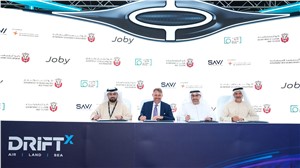Joby Partners with Abu Dhabi to Establish Electric Air Taxi Ecosystem
April 26, 2024
-Joby Aviation, Inc. (NYSE:JOBY), a company developing all-electric aircraft for commercial passenger service, today announced it has signed a multilateral Memorandum of Understanding (MoU) with the Department of Municipalities and Transport - Abu Dhabi (DMT), the Abu Dhabi Department of Economic Development (DED) and the Department of Culture and Tourism - Abu Dhabi (DCT Abu Dhabi) that lays the groundwork for Joby to establish and scale air taxi services in Abu Dhabi and beyond.
The MoU, signed at the DRIFTx international thought-leadership and exhibition platform in Abu Dhabi, demonstrates the breadth of support available to Joby as part of their participation in the Smart and Autonomous Vehicles Industry (SAVI) cluster and builds on Joby’s existing commitments to the UAE, which include the exclusive right to operate air taxi services in Dubai, which the company expects to start as early as next year. The agreement also unlocks the potential for inter-emirate air taxi services, for example between Abu Dhabi and Dubai.
His Excellency Mohamed Ali Al Shorafa, Chairman of DMT, commented on the agreement, saying: "Abu Dhabi aims to spearhead the advancement and implementation of the next era of advanced mobility solutions. Through the Emirate’s SAVI cluster and this visionary partnership with Joby, we are not only laying the foundation for cutting-edge air taxi services but also shaping the future of transportation; igniting a journey where the sky is no longer the limit, but the beginning of endless possibilities. We look forward to seeing their innovative aircrafts take-off from the UAE capital, offering the world a glimpse, through Abu Dhabi, of what the future of mobility looks like.”
His Excellency Ahmed Jasim Al Zaabi, Chairman of ADDED, said: “The development of an advanced industrial and manufacturing base is a core driver of Abu Dhabi’s ‘economic diversification 2.0’ agenda as outlined by the Abu Dhabi Industrial Strategy (ADIS), which is strengthening the Emirate’s position as the region’s most competitive industrial hub by increasing access to financing, enhancing ease of doing business, and attracting foreign direct investment. Smart and autonomous vehicles in particular are experiencing rapid growth, buoyed by the launch of the SAVI cluster, which leverages Abu Dhabi’s world-class infrastructure to scale the operations of global companies. Joby’s expansion into Abu Dhabi is a testament to the success of this strategy.”
H.E. Mohamed Khalifa Al Mubarak, Chairman of DCT Abu Dhabi, said: “The MoU aligns seamlessly with our Tourism Strategy 2030, which underscores our steadfast commitment to fostering sustainable growth and strategic development in the travel and tourism sector. As part of our focus on infrastructure and mobility, we are collaborating closely with both government and private sectors to harness smart city initiatives and sustainable technologies. Through the adoption of green transportation solutions, we aim to enhance the quality of experiences offered to both our community and visitors. The introduction of scale air taxi services marks a significant addition, enhancing accessibility to natural attractions, tourist hotspots, and architectural landmarks, thereby elevating overall visitor experiences.”
JoeBen Bevirt, Founder and CEO, Joby Aviation, said: “Today’s agreement demonstrates the incredible momentum there is behind the adoption of clean flight across the UAE. We’re looking forward to delivering a fantastic experience for our future customers in Abu Dhabi and we’re excited to be unlocking the potential for zero-emissions flight between Abu Dhabi and Dubai. We’re grateful for the support and collaboration of our governmental partners and the entire ecosystem in Abu Dhabi and we remain deeply impressed by their commitment to building out a world-class aviation ecosystem in the Emirate.”
Joby’s aircraft, which is on display for the first time in Abu Dhabi at the DRIFTx event in Yas Marina, is designed to carry a pilot and four passengers at speeds of up to 200 miles per hour (321 km/h) with zero operating emissions and a remarkably low acoustic footprint. Its maximum range of 100 miles (161 km) would enable fast and clean air travel both within Abu Dhabi and across the wider UAE, with a journey from Abu Dhabi to Dubai taking around 30 minutes compared with around two hours by car during rush hour.
Joby has been working closely with the General Civil Aviation Authority (GCAA) of the UAE to define a path to support the region in becoming world leaders in the introduction of air taxis. The GCAA regulatory framework builds upon FAA standards with additional company testing and analysis alongside a high level of regulator oversight and an ongoing review process to ensure safety for early operations. Inter-emirate travel would require additional approval from the GCAA.
In November 2023, Joby’s aircraft became the first electric air taxi to fly in New York City, building on a number of recent successes including the launch of production at the Company’s initial manufacturing facility in California in June 2023 and the first ever delivery of an electric air taxi to the U.S. Department of Defense in September 2023. In February 2024, Joby confirmed it had completed the third of five stages required to receive type certification for its aircraft from the US Federal Aviation Administration. Joby is listed on the New York Stock Exchange and has raised more than $2 billion of funding to date, including investments from Toyota, Delta Air Lines, SK Telecom, Uber and Baillie Gifford.
Running from 25-26 April 2024 at Yas Marina Circuit, Abu Dhabi, DRIFTx is an international thought-leadership and exhibition platform dedicated to advancing the future of smart, autonomous, and sustainable mobility across air, land, and sea. Supported by the Abu Dhabi Investment Office (ADIO) and Abu Dhabi’s SAVI cluster, DRIFTx is a leading global event to showcase the latest in advanced urban mobility, driving discussions, collaboration, and innovation across the sector.
Source : Joby Aviation

